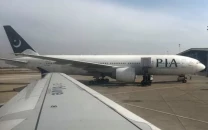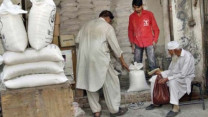Addressing questions on wheat import
Making structural shifts in the economy is not easy and will take strong political will

PHOTO: REUTERS
Liberalising imports will have to go hand in hand with a reform of the procurement system, which in its present form costs around Rs35 billion. Such reform would include lower procurement prices more in line with prices in world markets. It would also include lower procurement targets. For example, the government may wish to limit procurement to meet food requirements of the forces and other government agencies, and build up a strategic stock of one to two million tons for emergency operations.
Many readers appreciated the thrust of the arguments but raised a number of questions. We are grateful to them and would like to try and address three important ones.
Firstly, should we be self-sufficient in wheat? The statement that “wheat is our staple crop and we must be self-sufficient” certainly has strong emotional appeal. However, there are a few things to keep in mind. No one eats grains of wheat. The wheat has to be harvested, threshed, transported, ground into atta and then cooked. All of this needs energy, machinery, and infrastructure. Many of these are imported or need imported inputs. We personally see no reason why the country should be self-sufficient in raw wheat but not in all the things that are needed to bring it to our table. In addition, we currently import other food items that are as essential as wheat in our diets — these include edible oils and oilseeds, pulses, animal products, fruits and vegetable — the largest being edible oils (Rs250 billion). Reducing the area under wheat would allow us to produce more oilseeds, fodder, pulses and horticulture products which have a far greater economic return to the limited water we have, particularly in the winter (rabi) season.
Secondly, can we make the transition from wheat to high-value crops? It could be argued that given the current state of the public-sector support services for agriculture it would be difficult to make this transition. It is true that apart from some exceptions, government services related to agriculture are poorly funded, very inefficient and badly organised. Moreover, what support services are available tend to focus on the “Big Four” (wheat, rice, cotton and sugarcane) with relatively little being done for other products such as livestock, horticulture, oilseeds and pulses. But are such public-sector services essential for change to happen? Can we make changes in the absence of such services?
Structural transitions are mostly driven by the private sector responding to prices, technology and market opportunities. The availability of government services can help, but is not essential. Crops such as maize, potatoes and tomatoes spread around the world without the help of a single extension agent! In Pakistan, an excellent example is that of the poultry industry which has grown without any help and assistance from the government. What the government can and should do is stop interfering in the market and let prices reflect basic economic facts — and in the case of wheat, this means not propping up domestic prices and restricting imports.
There are also a number of other ways that the government can help this transition. One way would be to pursue trade deals with wheat surplus countries such as Romania, Ukraine or even Kazakhstan.
Thirdly, can we afford the foreign exchange to import wheat? Reducing domestic prices and increasing imports does not mean a complete stop in the production of wheat. More than half the wheat produced in Pakistan (say 12-15 million tons) is produced by small to medium farmers for self-consumption, either in the rural areas or for family members in cities and town. This wheat is not marketed and prices have no impact on the production. In other areas, land, labour, climate, and above all farm size may make it efficient to grow wheat. Our rough estimate suggests that even with prices 20% lower than current ones, wheat production would be around 22-23 million tons (studies show own-price supply elasticities of around 0.3) and import needed would be about two to three million tons. At an international price of $200 per ton, this would cost Pakistan about Rs60-95 billion. This could be more than compensated for if we can move land and other productive resources towards import substitution (oilseeds, pulses and fodder) or export promotion (fruits, vegetables and livestock).
Similar arguments also apply to the sugar sector. We are a short scare country but produce sugarcane, which has a very high water requirement, at prices above international levels. In many areas, sugar is replacing cotton. Liberalising imports of sugar would help lower prices and promote a shift back to cotton which Pakistan is now importing to keep its textile industry going.
Making structural shifts in the economy is not easy and will take strong political will. However, it is imperative that such changes are made. The recent spikes in atta and sugar prices make it a very opportune time to do this.
Go for it, Mr Kaptaan! Turn this crisis into an opportunity.
Published in The Express Tribune, February 29th, 2020.
Like Opinion & Editorial on Facebook, follow @ETOpEd on Twitter to receive all updates on all our daily pieces.



















COMMENTS
Comments are moderated and generally will be posted if they are on-topic and not abusive.
For more information, please see our Comments FAQ